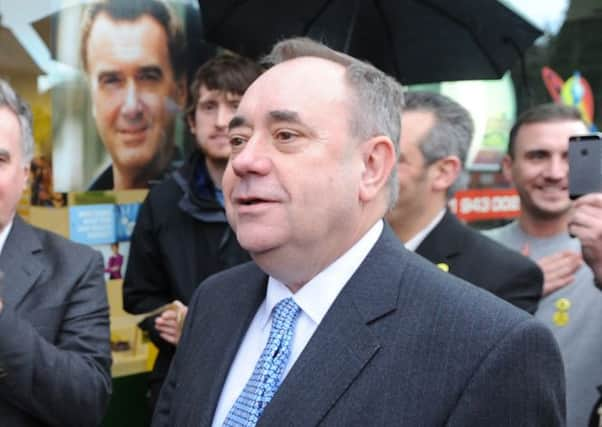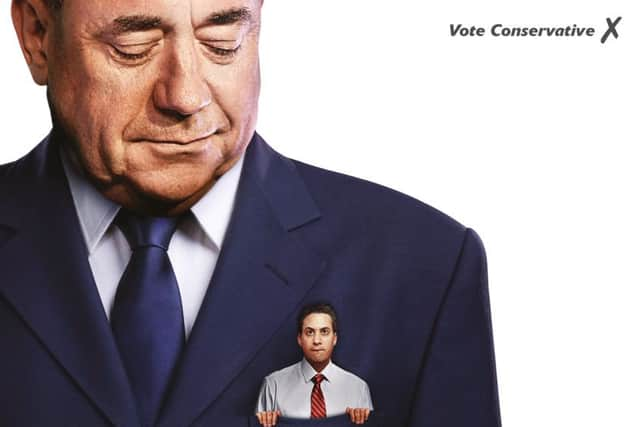SNP to back Labour on English tuition fees


Nicola Sturgeon’s manifesto will attempt to present the SNP as a party that can deliver policies on a UK-wide basis, although it is only standing candidates north of the Border.
Launched tomorrow, the prospectus will promote the idea of the SNP and Labour working together in the event of the Nationalists holding the balance of power in a hung parliament.
Advertisement
Hide AdAdvertisement
Hide AdKey to Sturgeon’s attempt to woo Miliband into a post-election pact will be her pledge to back Labour’s promise to reduce English tuition fees from £9,000 to £6,000.
The possibility of Sturgeon and Labour working together has become the defining issue of the general election campaign with opinion polls suggesting the surge in Nationalist support will see the SNP play the role of kingmaker after 7 May.
More evidence of the rise of the SNP and the decline of Scottish Labour is provided by today’s Scotland on Sunday “poll-of-polls”.
Analysis of opinion polls conducted over the past week shows the SNP is in line to capture 51 of the 59 Westminster seats in Scotland, an increase of six seats from the 45 predicted in a similar exercise last week.
The SNP rise comes at the expense of Scottish Labour, which is now in line to win five Scottish seats, a fall from the ten forecast last week and a drastic reduction from the 41 seats held by the party before the House of Commons broke-up for the election.


The “poll-of-polls”, calculated by John Curtice, Professor of Politics at Strathclyde University, put the Liberal Democrats in line for one Scottish seat. An increase in support for Ruth Davidson’s Conservatives puts them in line to increase their Commons representation from a single MP to two.
With the UK-wide arithmetic suggesting Miliband would need to be propped up by the SNP to pass legislation in the Commons, Sturgeon will argue that supporting a tuition fees cut is an example of how the SNP would act as a “progressive” influence across the UK.
Yesterday SNP depute leader Stewart Hosie said: “A strong team of SNP MPs at Westminster would support the reduction of tuition fees for students south of the Border – giving more young people the chance to go to university. Our preference would be no tuition fees in England either, but we will certainly vote for a reduction.
Advertisement
Hide AdAdvertisement
Hide Ad“This is an example of the progressive influence the SNP can have at Westminster – and demonstrates exactly how we can help deliver policies for the benefit of people beyond Scotland.
“Labour, the Lib Dems and the Tories all have an appalling track record on this issue – abandoning students and breaking promises. In the event that the next party of government chooses to do the right thing and at least reduce unfair tuition fees, they will certainly have the backing of the SNP.”
In the past, SNP MPs have abided by a policy of not voting on English-only matters. That stance changed recently when Sturgeon signalled that her MPs would vote on English-health issues on the grounds that there were budget repercussions for the Scottish NHS.
When it comes to English tuition fees, the SNP will argue that the more private money through tuition fees that goes into English universities, the less public money is spent on education south of the Border.
The less taxpayers’ money spent on English education, the less public money comes to Scotland through the Barnett Formula, the funding mechanism that determines the size of Scotland’s block grant.
The SNP manifesto will set out the party’s support for independence, but will acknowledge that the general election is not a vote about the future of the UK. After last year’s No vote, it will confirm the party’s promise to fight for full-fiscal autonomy – the devolution of all tax and spending powers to Holyrood. It is expected to say that the move to full fiscal autonomy will take a number of years.
Yesterday former first minister Alex Salmond attempted to put more pressure on Miliband to work with the SNP on a day he spent campaigning with Sturgeon in the North-east.
Salmond said Labour would find it difficult to avoid dealing with the SNP in a hung parliament, saying parties would have to face up to the “electorate’s judgment”.
Advertisement
Hide AdAdvertisement
Hide AdAlthough Miliband has dismissed a formal coalition, he has repeatedly failed to rule out informal deals with the Nationalists.
Yesterday Labour claimed the SNP’s desire for full fiscal autonomy meant Sturgeon’s party was unable to support its tuition fees policy, because the plan was to fund it by restricting tax relief on pension contributions for the highest earners.
Labour argued that full fiscal autonomy would break up the UK-wide pension scheme.
Scottish Labour’s deputy leader Kezia Dugdale said: “Stewart Hosie is simply saying that the SNP will vote for a Labour policy. In that case, what’s the point of voting SNP – Hosie is repeating what Jim Murphy says, that if you want a Labour government with Labour policies then you should vote Labour.
“It’s no surprise that the SNP are copying the Labour party. The truth is that if they didn’t copy Labour policies they’d have none of their own apart from a second referendum no-one wants and full fiscal autonomy that would slash public spending in Scotland.
“Full fiscal autonomy would blow a £7.6 billion black hole in Scotland’s budget.”
Davidson said the only way to stop a Labour/SNP deal was to vote Conservative. She added: “I said at the turn of the year that Ed Miliband and Nicola Sturgeon were halfway down the aisle towards a deal. The truth is that they are now at the altar, and preparing to sign the register.”